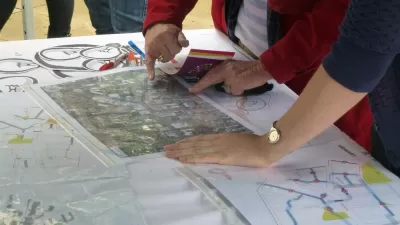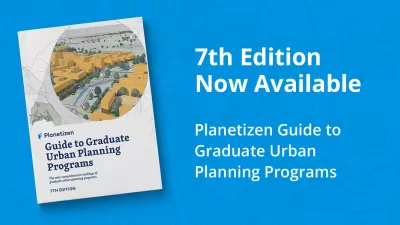Making better places is a core value for many planners, but don’t let a lack of passion stand between you and a strong career in planning.

The range of backgrounds among urban planners is as broad as the discipline itself, and the path toward urban planning is anything but traditional. For example, when I began planning school at a large university and each of the 35 students in my cohort introduced themselves during orientation week, almost everyone described very different backgrounds: science, real estate, biology, economics, politics, environmental studies, graphic design, construction management, architecture, sociology, public health, education, and more. The realization that we were all outsiders was reassuring and ironically, it created bonds among the student community. Our new-student anxiety diminished upon learning that we came from all walks of life. The real challenge would be figuring out how to work together on teams—or even with,
In an earlier article, "Become an Urban Planner Now," I wrote that would-be planners should not wait to pursue an interest in planning. Exposure to our profession tends to lag behind other popular careers, and so it is wise to see if planning is a good fit while there’s still time to consider early career paths.
For those ready to take the next step, a disclaimer: You don’t need to be passionate to be a successful planner. This goes against popular career advice.
Back to student orientation week. In addition to describing our backgrounds, each member of the cohort also shared the reasons why we chose to pursue planning. This is where our similarities began to emerge: To make better places, to advocate for the under-served, to protect the environment….we all wanted to save the world in some way.
At this juncture many of us concluded that each student was extremely passionate about their career path. Why else would we have chosen to go back to school? Plus, saving the world demands nothing less than passion, right?
Not necessarily, future planners.
Yes, something meaningful must have sparked our interest. For me, it was loving the outdoors as a kid. Others loved riding the train. Helping people. Reading maps. Drawing. Playing SimCity. Walking to the coffee shop. Growing food in a garden. At some point in their life each student translated a civic interest into urban planning.
I've mentored many graduate students at different planning schools since the time I was a student myself, and I notice that planning students tend to be very quick to highlight the degree to which they are enthusiastic about their chosen field. It's infectious, and one of the main reasons I love mentoring. Being around students is a jolt of positive energy that reminds me why planning matters.
But I am often curious why students feel compelled to readily justify the reason they are pursuing planning. There is nothing wrong with embracing passion, but I sometimes worry that passion becomes competitive, and potentially alienating for those who aren't feeling it. Yes, we want to save the world. But it is also challenging from a student perspective to know what the everyday life of a planner is like because planners frequently operate behind the scenes and outside of popular culture.
If you are interested in planning but not feeling the passion—maybe because you are not sure what committing to this job actually looks like—you are not alone. And whether this matters depends how you measure success in your career.
I received a heavy dose of the meaningful-jobs-require-passion mantra when I took a career evaluation course as an undergraduate student. The entire semester was based on readings from the book, What Color is Your Parachute? The premise of this legendary career guidance book is that job satisfaction is achieved when you align your career with your personality, skills and interests. So true. But should we become discouraged if those characteristics aren't in alignment? Those from the school of passion might say it's time to pick another career path.
But much has been written recently about the problems with this advice. Cal Newport speaks about this topic on Adobe’s 99U, a site I look to regularly for productivity insights. Cal is an author who focuses on unconventional advice for life during school and after graduation, and he argues that following your passion is astonishingly bad advice. To Mr. Newport, passion is not innate, rather it is cultivated after first building skills and value.
Cal’s argument resonated with me because it brought me back to a period of time during graduate school where I was feeling a lack of passion, and therefore wondered if I was on the right career path. Then one day, a fellow student put a finger right on the sore spot.
It went like this:
Two of us were chatting over coffee one day between classes (it was Seattle, we always went for coffee) and the conversation turned toward which academic specialty we were considering, and the types of planning jobs those specialties might translate to. I rattled off a few ideas I was toying with in a noncommittal manner, and he interjected bluntly with, “Well, is it your passion?”
I hated this question because the only answer I could think to give was, "Uh, I think so," which is the wrong answer to that question. I didn't know if I was passionate. That worried me, and I didn't want to admit it.
There were a few things I was certain of though. I liked people. I liked places. I like analyzing and creating. I wanted more bike lanes, skate parks, and trees. I also wanted to work outside, which tended to run counter to the planning=passion equation.
The student wasn't trying to push my buttons with his question. He was merely quoting every career guidance book we'd ever read, and reminding me of the fundamental criteria we thought we needed to satisfy to know we were on the right path. Besides, if you know without question that you are passionate about your career path, then you immediately justify the time and expense of graduate school. Whereas for me, responding to his question with, "Uh, I think so," felt as reassuring as saying, "Yes,I think I want to get married."
But this moment didn't need to feel so deflating. He was probably gauging my passion to help cope with his own self-doubt. Plus, many successful marriages begin with hesitation. Planners need to be know how to deal with uncertainty, and working through your own career hesitation, opening doors, seizing opportunities, learning from failure, and reinventing your skills will help you weather a storm of uncertainty. Many happy and effective planners have stepped into the field not sure if saving the world could also be fun.

Maui's Vacation Rental Debate Turns Ugly
Verbal attacks, misinformation campaigns and fistfights plague a high-stakes debate to convert thousands of vacation rentals into long-term housing.

Planetizen Federal Action Tracker
A weekly monitor of how Trump’s orders and actions are impacting planners and planning in America.

San Francisco Suspends Traffic Calming Amidst Record Deaths
Citing “a challenging fiscal landscape,” the city will cease the program on the heels of 42 traffic deaths, including 24 pedestrians.

Defunct Pittsburgh Power Plant to Become Residential Tower
A decommissioned steam heat plant will be redeveloped into almost 100 affordable housing units.

Trump Prompts Restructuring of Transportation Research Board in “Unprecedented Overreach”
The TRB has eliminated more than half of its committees including those focused on climate, equity, and cities.

Amtrak Rolls Out New Orleans to Alabama “Mardi Gras” Train
The new service will operate morning and evening departures between Mobile and New Orleans.
Urban Design for Planners 1: Software Tools
This six-course series explores essential urban design concepts using open source software and equips planners with the tools they need to participate fully in the urban design process.
Planning for Universal Design
Learn the tools for implementing Universal Design in planning regulations.
Heyer Gruel & Associates PA
JM Goldson LLC
Custer County Colorado
City of Camden Redevelopment Agency
City of Astoria
Transportation Research & Education Center (TREC) at Portland State University
Jefferson Parish Government
Camden Redevelopment Agency
City of Claremont






























